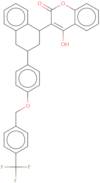Product Information
- 4-Hydroxy-3-[1,2,3,4-tetrahydro-3-[4-[[4-(trifluoromethyl)phenyl]methoxy]phenyl]-1-naphthalenyl]-2H-1-benzopyran-2-oneStormWL 1083 66
- 2-hydroxy-3-[3-(4-{[4-(trifluoromethyl)benzyl]oxy}phenyl)-1,2,3,4-tetrahydronaphthalen-1-yl]-4H-chromen-4-one
- 2H-1-Benzopyran-2-one, 4-hydroxy-3-[1,2,3,4-tetrahydro-3-[4-[[4-(trifluoromethyl)phenyl]methoxy]phenyl]-1-naphthalenyl]-
- 4-Hydroxy-3-[1,2,3,4-tetrahydro-3-[4-[[4-(trifluoromethyl)phenyl]methoxy]phenyl]-1-naphthalenyl]-2H-1-benzopyran-2-one
- 4-hydroxy-3-[3-(4-{[4-(trifluoromethyl)benzyl]oxy}phenyl)-1,2,3,4-tetrahydronaphthalen-1-yl]-2H-chromen-2-one
- Storm
- Storm (rodenticide)
- Wl 108366
Flocoumafen is an insecticide that inhibits the growth of cancer cells by interfering with the synthesis of protein tyrosine kinase. The enantiomeric purity of Flocoumafen is analyzed using an analytical method that involves human serum and wastewater treatment, as well as sample preparation methods. Flocoumafen has been shown to inhibit the proliferation of human tumor cells in vitro and in vivo, although it has not been tested on animal models. Flocoumafen binds to a monoclonal antibody (PA-1) that is specific for the CDK4 protein tyrosine kinase. The binding results in inhibition of CDK4 activity and cell cycle arrest at G2/M phase. Flocoumafen also inhibits the expression of interleukin-8, a proinflammatory cytokine that plays a role in tumor progression. Hydroxyl groups are present on Flocoumafen's chemical structure,





